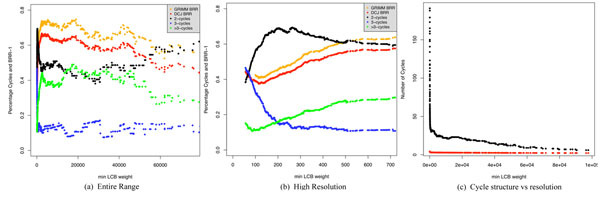Figure 4.
Cycle structure and BRR as a function of LCB weight In this figure, cycle structure is compared with breakpoint reuse rate (BRR). The entire range of min LCB weight is shown in (a). In (b) we magnify the high resolution (low min LCB weight) portion of the graph. In (c) we represent the number of >3-cycles (usually called >6-cycles) vs the theoretical prediction for random permutations derived earlier. Cycle decomposition of the human-mouse transformation is graphed against BRR minus 1 so that the contributions of different cycles can be evaluated. The Grimm breakpoint reuse rate minus 1 is shown in mustard orange in (a) and (b). The corresponding DCJ version is in red in the same two panels. The fraction of 2-cycles (conventionally 4-cycles) are shown in black in (a) and (b). The fraction of 3-cycles (usually called 6-cycles) and >3 cycles is shown respectively in blue and green in (a) and (b) and in black in (c).

